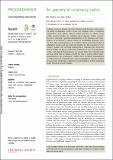The geometry of evolutionary conflict
Abstract
Conflicts of interest abound not only in human affairs but also in the biological realm. Evolutionary conflict occurs over multiple scales of biological organization, from genetic outlawry within genomes, to sibling rivalry within nuclear families, to collective-action disputes within societies. However, achieving a general understanding of the dynamics and consequences of evolutionary conflict remains an outstanding challenge. Here, we show that a development of R. A. Fisher's classic ‘geometric model’ of adaptation yields novel and surprising insights into the dynamics of evolutionary conflict and resulting maladaptation, including the discoveries that: (i) conflict can drive evolving traits arbitrarily far away from all parties' optima and, indeed, if all mutations are equally likely then contested traits are more often than not driven outwith the zone of actual conflict (hyper-maladaptation); (ii) evolutionary conflicts drive persistent maladaptation of orthogonal, non-contested traits (para-maladaptation); and (iii) modular design greatly ameliorates conflict-driven maladaptation, thereby facilitating major transitions in individuality.
Citation
Rautiala , P T & Gardner , A 2023 , ' The geometry of evolutionary conflict ' , Proceedings of the Royal Society of London Series B: Biological Sciences , vol. 290 , no. 1992 , 20222423 . https://doi.org/10.1098/rspb.2022.2423
Publication
Proceedings of the Royal Society of London Series B: Biological Sciences
Status
Peer reviewed
ISSN
0962-8452Type
Journal article
Description
Funding: This study was funded by a Natural Environment Research Council Independent Research Fellowship (grant no. NE/K009524/1) and a European Research Council Consolidator Grant (no. 771387).Collections
Items in the St Andrews Research Repository are protected by copyright, with all rights reserved, unless otherwise indicated.

